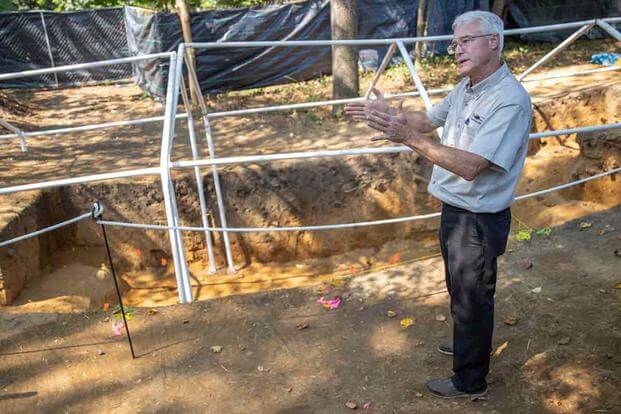A Year After Revolutionary War Soldiers from 1777 Were Found in a NJ Field, Questions Remain

It was one year ago Wednesday that officials announced a startling discovery at one of New Jersey’s Revolutionary War battlefields.
An archeological dig just outside Red Bank Battlefield Park in Gloucester County, aimed at mapping a wartime trench, had accidentally uncovered the skeletal remains of a dozen or more individuals in an unmarked mass grave lost to history for 245 years.
All of the remains were believed to have been Hessian soldiers who died fighting for Great Britain against the Continental Army in a 1777 battle.
The discovery was made in June 2022 on the fourth and final day of a public dig that attracted more than 100 volunteers and was led by Wade Catts, an archeologist. It was announced to the public Aug. 2, drawing national attention and reviving interest in the Battle of Red Bank, in which an outnumbered group of colonists staved off an effort by the British to capture Fort Mercer.
“I think what has most impressed me since the announcement of the discovery is the level of public engagement. The team recognized this was a very significant discovery, but I don’t think we understood at the time just how much our project would resonate with the public,” said Jen Janofsky, director of Red Bank Battlefield Park.
One year later, several key questions stemming from the discovery remain unanswered.
Researchers do not know the precise number of individuals recovered from the excavated trench, Janofsky said. The total number is 15 or more and DNA testing remains underway, she said.
The conclusion that the soldiers were Hessians was based on items recovered by the remains, including a King George III gold guinea that would have been the equivalent of a soldier’s monthly pay, officials said previously.
Samples from the remains were initially analyzed by the New Jersey State Police’s Forensic Unit, which had been seeking to extract DNA from bones and teeth. The samples were then sent more than 3,000 miles away to Astrea Forensics, Janofsky said.
Astrea Forensics, located in Santa Cruz, California, was founded in 2019 by paleogeneticists to apply DNA techniques and direct genome sequencing to difficult-to-solve forensic casework and the identification of human remains, according to its website. The lab claims it has the ability to recover genetic profiles from rootless hair and other highly degraded samples, for which traditional forensic DNA testing might not be sufficient.
Janofsky said the lab is attempting to determine the quality of the DNA.
“This will guide future studies. We are also exploring stable isotope analysis which holds the potential to identify region, diet and ethnicity,” Janofsky said.
Results of ground-penetrating radar testing, aimed at determining if additional remains are located at the battlefield, are pending, she said. The testing was underwritten by $49,500 in grants from the New Jersey Historical Commission and Gloucester County.
“Based on our work from last year, there is, of course, always some potential for additional remains to be found at Red Bank,” Janofsky said.
Red Bank Battlefield Park is located in National Park, a borough in Gloucester County on the Delaware River. The battlefield is not part of the similarly-named Borough of Red Bank in Monmouth County, located about 90 miles away on the Navesink River.
Red Bank Battlefield Park covers 44 acres and is owned by Gloucester County.
The Revolutionary War-era trench where the remains were located extends onto an adjoining, quarter-acre site that was acquired by Gloucester County in 2020 and, until last year’s dig, had not been thoroughly explored by archeologists.
No decision has been made on where, or when, to rebury the remains, she said.
Ashbrook’s Burial Grounds, located about 9 miles away in Glendora, Camden County, already serves as the final resting place for up to 50 Hessian soldiers who died from their wounds in the 1777 battle.
Janofsky and Catts, the archeologist who led the dig at the site, have been offering dozens of in-person and virtual presentations on the find and ongoing work. Sponsors have included the Daughters of the American Revolution, Gloucester County Historical Society, Lenape Regional High School in Meford and Monsignor Farrell High School in Staten Island, N.Y.
Students at Rowan University, where Janofsky is the public historian, participated in a six-week project at the battlefield in the spring, in which they learned about excavation and identifying artifacts.
Conservation work on many items recovered from last year’s project — including two gunflints, one musket ball, seven plain and repousśe buttons and two knee buckles — is being unwritten by a $2,937 grant from the Society of the Cincinnati in the State of New Jersey, a group that makes grants to support local Revolutionary War-related sites and organizations, she said.
Upon completion, the items will be displayed in the James and Ann Whitall House, located at the battlefield park.
“Over the past year Wade and I have met hundreds of people who are truly invested in our work. They email us, attend our presentations, and let us know how impactful the work that we are doing is,” Janofsky said.
“The work of identifying those lost to history in a mass grave really connects with the public. In many ways, they are experiencing what our team experienced last year. People are clearly moved during our presentations, and I’ve lost count of how many have said ‘thank you’ to us. As a public historian, it’s been remarkable to take this journey with them,” Janofsky said.
Please subscribe now and support the local journalism you rely on and trust.
Rob Jennings may be reached at rjennings@njadvancemedia.com.
©2023 Advance Local Media LLC. Visit nj.com. Distributed by Tribune Content Agency, LLC
No comments:
Post a Comment